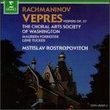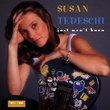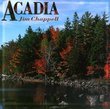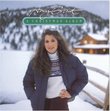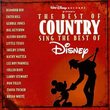| All Artists: Thomas Hampson, Thomas Paul, Felix [1] Mendelssohn, Robert Shaw, Florence Quivar, Marietta Simpson, Atlanta Symphony Orchestra & Chorus, Barbara Bonney, Henriette Schellenberg, Reid Bartelme, Jerry Hadley, Richard Clement Title: Mendelssohn: Elijah / Shaw, Bonney, Quivar, Hadley, Hampson, Atlanta Symphony (Sung in English) Members Wishing: 1 Total Copies: 0 Label: Telarc Release Date: 9/26/1995 Genre: Classical Styles: Opera & Classical Vocal, Historical Periods, Modern, 20th, & 21st Century, Symphonies Number of Discs: 2 SwapaCD Credits: 2 UPC: 089408038921 |
Search - Thomas Hampson, Thomas Paul, Felix [1] Mendelssohn :: Mendelssohn: Elijah / Shaw, Bonney, Quivar, Hadley, Hampson, Atlanta Symphony (Sung in English)
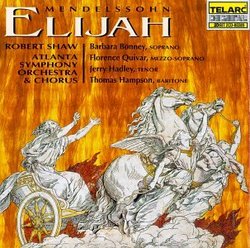 | Thomas Hampson, Thomas Paul, Felix [1] Mendelssohn Mendelssohn: Elijah / Shaw, Bonney, Quivar, Hadley, Hampson, Atlanta Symphony (Sung in English) Genre: Classical
|
Larger Image |
CD DetailsSimilarly Requested CDs
|
CD ReviewsVery excellent, especially the choral work 12/16/2003 (5 out of 5 stars) "Having sung in this oratorio many times (both the contralto, and the soprano solo parts) I was very familiar with the work. What hit me first in this recording was the WORDS were not the same as those I had sung so many times. It was sort of a jolt. Instantly, that made me wonder what was going on, after all, didn't Mendelssohn write this oratorio in English. Well, he did, but it was an English translation of the German libretto which came from the German translation of the Bible. We were all used to those words, and they have taken on special meaning. There have even been recordings of the past that gave the scriptural cross references to those lines. Well, what has happened here is the conductor and others have actually gone back to those scriptural references and made sure the words sung are those found in our King James Version of the Bible. The changes in this text are not that great, but they are noticeable. Do I like them? Well, yes, but I have to admit while listening to the recording my mind always trails back to the familiar words. There are a few things different about this recording than most. Firstly, there are not only four soloists, but nine of them. To some, with our tradition of having only four soloist, that may seem odd. It is not at odds with the original performance. In this oratorio, like many by Bach, there are soloists who are simple commentators, and some who are characters. We never had that distinction in other recordings. It is refreshing to hear it. Thus, we hear very different voices intone the "mother" and those who are just singing commentary (the first duet in the oratoria). It wasn't necessary to do this, and the oratorio works quite well if it is not done, but there is an added sense of drama, like we are witnessing a real story not just talking about it when we hear certain voices associated with certain people and events. I found it delightful to listen to the good diction in English of some of the singers, though not all the women have good diction in English. I wonder why we tolerate bad diction in English but simply won't tolerate it in Italian or German? That is a very eternal question for me. I remember one of my own teachers saying that if a singer can't sing in their own language and make sense how can they really sing in a foreign one? Whether her conclusion was correct or not, I do know that with all the "Native English speaking singers" out there why so few of them have mastered diction in their own language. It would be wonderful if they had teachers wise enough to help they understand the pure Italian vowels they sing don't fit English where there is no such thing as a pure vowel. One singer who bad diction cannot be leveled at is Thomas Hampson. It is a real pleasure to hear him sing the Part of Elijah. I have an old recording of this oratorio with Dietrich Fischer-Dieskau, Nicolai Gedda, Gwyneth Jones, and Janet Baker. Each of them sing English masterfully and clearly, no distortion, yet, only two of them are native English speakers. Gedda and Fischer-Dieskau have the most wonderful English, and one would think they really spoke the language from birth as it has no "foreign" sound to it at all. Thomas Hampson comes super close to having the same affect with his diction as Fischer-Dieskau, and filling the text with special meaning (as this fine German artist did). Sadly, the rest of the cast, though understood, simply doesn't have his mastery of "Their own language." I say that because everyone in this recording IS A NATIVE ENGLISH SPEAKER. The quality of the singing is superb and it cannot be faulted. The orchestral presentation is masterful. The choral work is breathtaking, and with an oratorio like this, the chorus is what makes or breaks it far more than the soloists. The quality of the recording is superb, though I wish the sound were more "full-bodied." I have this complaint about most digitally created CD's. The old Annalog recording method captured the brilliance and the depth of the music more completely. In digital music it seems the upper overtones are lost, but the "shrillness" of the high notes is not, and the depth and sonorous sound of the lower harmonics is not full or complete enough (and adding the "enhanced bass" setting does not give the reality of the depth to the sound). Having heard all the lead singers in life, I can tell you there is that special depth of tone, that richness that is part of their sound that simply is not there. One person who is really losing out in representation of her sound is Florence Quivar. Whatever her flaws in diction, her sound is rich and plummy, but you wouldn't know that listening to this recording. Even Thomas Hampson, though his voice is not a huge one, doesn't quite reflect his ability to resonate. His sound is very resonnant, very full, and it has a depth of emotion that is spine tingling. His voice caresses and invites the listener in. In some ways, it sounds like we are invited to listen in, but to stay out of the room in which he is singing. This is all the balance of the technicians. Wonderful as digital technology is, it still can't capture the human voice with all the nuances and overtones it has. I doubt any form of recording ever has, but it is missing some of the most important parts of it. The result of all this is a performance, wonderful as it is, that is lacking the amount of life it should have. One knows this is NOT the result of anything the performers or conductor are doing, for one can get that life if you play the recording quite loudly. The problem is, one shouldn't have to play it loudly to feel that. Whether this is the best of the best, I couldn't say. It is a good recording and well worth adding to your library. The approach is different from the common way of doing things, and that adds a special refreshing touch to a work that is well known, and well performed." Simply an excellent and enjoyable performance N. Peden | Oregon | 05/01/2000 (5 out of 5 stars) "Growing up, my family played an LP of Elijah almost every week. As I grew up, I discovered what an excellent recording it was. When I went searching for my own copy a few years ago on CD, I bet on the conducting of Robert Shaw. I have never regretted the purchase, and have never grown tired of the recording. The singing is excellent, and the conducting superb. This is my favorite classical cd in my collection, and I've even bought a copy for my Mother!" The music's Superb! N. Peden | 01/23/2000 (5 out of 5 stars) "I've had this CD for quite some time and its a good thing its not an old vinyl record because I would have worn the grooves smooth by now. I listen to this work several times each week as I drive to and from work.My recording us by Robert Shaw and the Atlanta Symphony Orchestra and Chorus. It runs 2 hours and 12 minutes.If not familiar with the story of Elijah and King Ahab and Queen Jezebel you can read it in I Kings 17. But better yet, listen to this dynamic recording and be prepared for a sound adventure. This recording has some of the most stirring and dynamic choruses you could ever hope to hear. (Surround sound is GREAT! Be sure all your knick knacks are well secured and crank up the volume.) The music is superb, the message is timeless. The characters could be Bill and Hillary today. Check it out!"
|

 Track Listings (24) - Disc #1
Track Listings (24) - Disc #1
